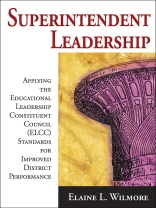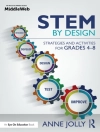‘Targeted to meet the needs of superintendents or those aspiring to the position. The stories, vignettes, and reflective exercises for the reader are major strengths.’
—Dan Lawson, Superintendent
Tullahoma City Schools, TN
‘This is the first professional book that I have found exciting to read in a long time—I really couldn′t put it down! It made me immediately want to gather my leadership team together to devise our own plan. A terrific discussion starter, as well as a step-by-step plan for implementing and assessing new programs.’
—Marie Blum, Superintendent
Canaseraga Central School District, NY
Maximize districtwide performance through realistic, standards-based practice!
Written by the past president of the National Council of Professors of Educational Administration, this valuable resource examines the knowledge, skills, and dispositions that superintendents must develop to effectively manage change in today′s schools.
Elaine L. Wilmore examines the Educational Leadership Constituent Council (ELCC) standards—the new benchmarks established by NCATE and ISLLC for a highly effective superintendency—and shows how administrators can incorporate each standard into their global vision and everyday practice. Through case studies, problem-based learning, an assessment model, and reflective questions and activities, this reader-friendly handbook discusses ways for superintendents to:
- Attain proficiency in each ELCC standard
- Develop a positive district culture
- Manage operations, resources, and community involvement
Superintendent Leadership is ideal for the development of future superintendents and the continuous professional learning of current administrators as leaders of the learning community.
Cuprins
Preface
Acknowledgments
About the Author
1. The Educational Leadership Constituent Council Standards as Tools for Improved District Performance
Superintendent Concerns Generated by a Changing Society
What Skills Should a Twenty-First-Century Superintendent Possess?
Knowledge
Skills
Dispositions
History and Development of the Educational Leadership Constituent Council Standards
What Are the ELCC Standards?
Creating the Connection Between the ELCC Standards and Realistic Practice
The Role of the Superintendent in a Changing Democratic Society
2. It′s All About the Vision
Standard 1
Introduction
Philosophical Framework
Developing a District Vision
Articulating the District Vision
Implementing the District Vision
Being a Good Steward of the District Vision
Promoting Community Involvement in the District Vision
Problem-Based Learning
Developing and Articulating a District Vision: Where Are We Going to Put So Many New Students?
Reflective Practice: Pause and Think
Implementing and Being a Good Steward of the District Vision: Let′s Try This One More Time
Reflective Practice: Pause and Think
Promoting Community Involvement in the District Vision: But…We Used to Win All the Time! What′s Going On?
Reflective Practice: Pause and Think
Assessment Model
Ways for You to Do It
Conclusions
The Ultimate Application
3. Advocating, Nurturing, and Sustaining Enhanced Student Learning and Staff Professional Growth
Standard 2
Introduction
Philosophical Framework
Promoting A Positive District Culture
Providing an Effective Instructional Program
Applying Best Practices to Student Learning
Designing Comprehensive Professional Growth Plans
Problem-Based Learning
Promoting a Postive District Culture: Hello! I′m New Here!
Reflective Practice: Pause and Think
Providing an Effective Instructional Program: But We′re Doing the Best That We Can!
Reflective Practice: Pause and Think
Applying Best Practices to Student Learning: Addressing the Dropout Problem in an Urban District
Reflective Practice: Pause and Think
Designing Comprehensive Professional Growth Plans: The Sowell-Watson CSD University
Reflective Practice: Pause and Think
Assessment Model
Ways for You to Do It
Conclusions
The Ultimate Application
4. Leadership Through Management of District Organization, Operations, and Resources
Standard 3
Introduction
Philosophical Framework
Managing the Organization of the District
Managing District Operations
Managing District Resources
Problem-Based Learning
Managing the Organization of the District: A Winding Road in an Urban Area
Reflective Practice: Pause and Think
Managing District Operations: Baby, It′s Raining Outside!
Reflective Practice: Pause and Think
Managing District Resources: Lord, Please Don′t Let Me Be Misunderstood
Reflective Practice: Pause and Think
Assessment Model
Ways for You to Do It
Conclusions
The Ultimate Application
5. Creating a Collaborative Learning Community
Standard 4
Introduction
Philosophical Framework
Collaborating with Families and Other Community Members
Responding to Community Interests and Needs
Mobilizing Community Resources
Problem-Based Learning
Collaborating with Families and Other Community Members: The Answer′s Not Blowing in the Wind
Reflective Practice: Pause and Think
Responding to Community Interests and Needs: The Faint of Heart Need Not Apply
Reflective Practice: Pause and Think
Mobilizing Community Resources: Jimmy Cracked Corn, and We Do Care
Reflective Practice: Pause and Think
Assessment Model
Ways for You to Do It
Conclusions
The Ultimate Application
6. The Ethical District Leader
Standard 5
Introduction
Philosophical Framework
Acts With Integrity
Acts Fairly
Acts Ethically
Problem-Based Learning
Acts With Integrity: Please Don′t Slay the Messenger
Reflective Practice: Pause and Think
Acts Fairly: Why Is This Happening to Me? What Did I Do Wrong?
Reflective Practice: Pause and Think
Acts Ethically: Is Equal Always Ethical? Or Is Ethical Always Equal?
Reflective Practice: Pause and Think
Assessment Model
Ways for You to Do It
Conclusions
The Ultimate Application
7. District and School Community Politics
Standard 6
Introduction
Philosophical Framework
Understanding the Larger Context
Responding to the Larger Context
Influencing the Larger Context
Problem-Based Learning
Understanding the Larger Context: It′s What′s Inside That Counts, or Beauty is Only Skin Deep
Reflective Practice: Pause and Think
Responding to the Larger Context: Change for the Sake of Change, or Too Much Change Too Fast?
Reflective Practice: Pause and Think
Influencing the Larger Context: Let′s Define Justice
Reflective Practice: Pause and Think
Assessment Model
Ways for You to Do It
Conclusions
The Ultimate Application
8. The Superintendent Internship
Standard 7
Introduction
Substantial
Sustained
Standards-Based
Domain I – Leadership of the Educational Community
Domain II – Instructional Leadership
Domain III – Administrative Leadership
Real Settings
Planned and Guided Cooperatively
Graduate Credit
Assessment Model
Conclusions
The Ultimate Application
9. It′s Up to You
Final Applications
Recommendations
Go Forth, and Do Well!
Suggested Additional Reading
References
Index
Despre autor
Learn more about Elaine Wilmore′s PD offerings Dr. Elaine Wilmore was a public school teacher, counselor, elementary, and middle school principal before she moved to higher education. She has extensive background in everything from Early Childhood Education to creating and leading doctoral programs. She currently serves as a Doctoral Dissertation Adviser for Nova Southeastern University. She
also founded and is President of Elaine L. Wilmore Leadership Initiatives, which
focuses on improving campus and district leadership to increase student
performance. Elaine
formerly served as a Professor, the Chair of Educational Leadership, Counseling, and Foundations and as the founding Doctoral Director at the University of Texas of the Permian Basin. She also served at Dallas Baptist University as Assistant Vice President for Educational Networking and Program Director for the M.Ed. and, again, the implementing director of the Doctor of Education degree in Educational Leadership. Prior to her position at Dallas Baptist University, Dr. Wilmore served as Special Assistant to the Dean for NCATE Accreditation, Chair and Associate Professor of Educational Leadership and Policy Studies at the University of Texas at Arlington (UTA), and was the founder of all initial Educational Leadership graduate programs at UTA including the innovative field-based and grant funded Educational Leadership UTA, which received national acclaim, and the Scholars of Practice program. While at UTA she also served as Director of University Program Development where she developed and was the original Chair of the Faculty Governance Committee for the College of Education. Dr. Wilmore’s respect amongst those in higher education has led her to serve as a tenure reviewer in four states and a manuscript and proposal reviewer for many conferences and professional journals. ‘I attended your workshop at College Station this past summer. I am happy to announce that I passed my certification exam the first time around! I am so excited and look forward to the future and what doors may open. Thank you for your strategies and your book!’ – Elodia Witterstaetter, TX












